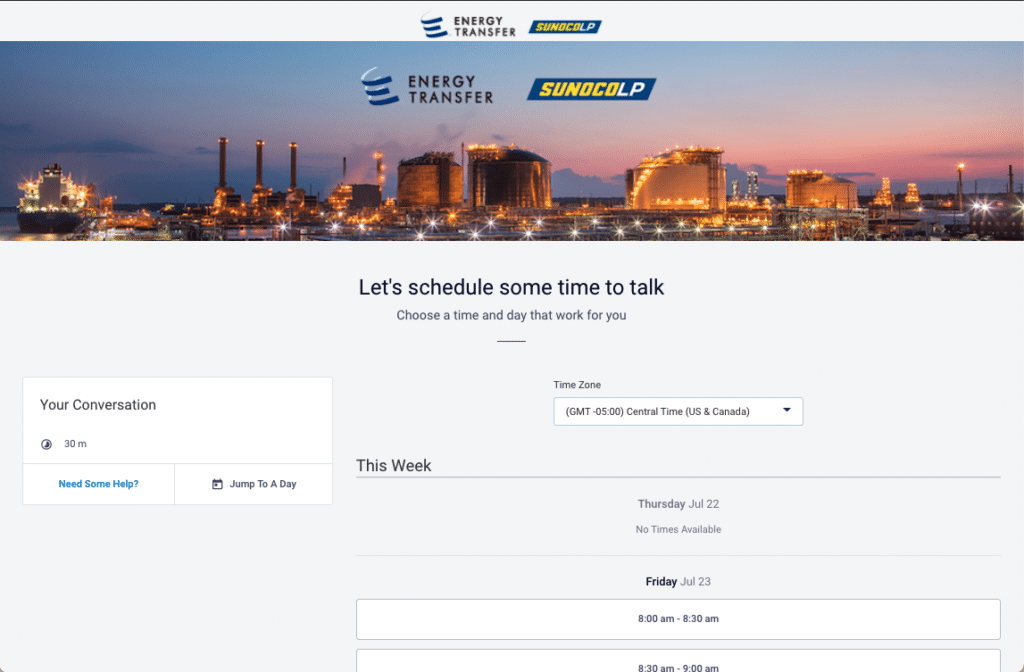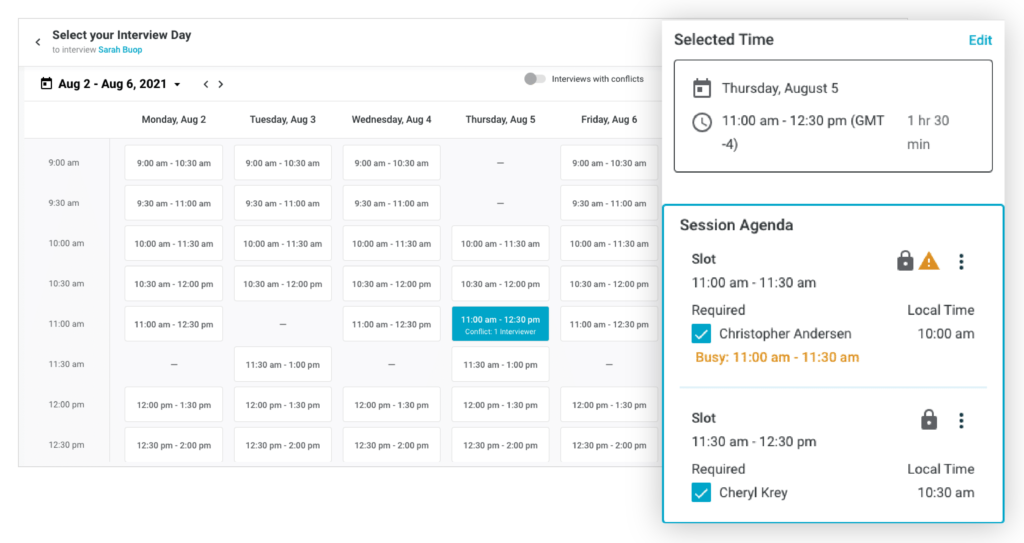Case Study
Energy Giant Reduces Interview Scheduling Time by 95% with Automation
At many organizations, recruiters spend more than half of their day scheduling interviews. With a high-volume workload of open reqs to fill, those administrative tasks add up – oftentimes to big numbers.
After struggling with similar interview scheduling challenges at Energy Transfer, Head of Talent Chris Andersen was ready for change – there just had to be a better way. Under his direction, Energy Transfer turned to Yello’s interview scheduling platform. Following a successful implementation, his team eliminated 95% of the time spent on scheduling interviews and sped up time to hire. Let’s look at how they did it:
Reduced time to schedule by 95%
By the numbers
- $39 billion Fortune 100 firm & general partner of Sunoco LP
- 10,000 employees
- 1,600 new hires in the first year using Yello
- Eliminated 1 week on average off the hiring process
- Cut 95% of administrative time from interview scheduling (from an average 60 minutes per interview to 3 minutes)
- Redirected over 3,000 hours of administrative burden
The organization
Energy Transfer is a 25-year-old, midstream energy company, headquartered in Dallas, TX. At number 69 on the Fortune 100 list, Energy Transfer brought in approximately $39 billion in 2020. Though not a household name, whenever you heat your home, cook with gas, or need hot water, there’s a strong likelihood that Energy Transfer’s 90,000 miles of infrastructure -– and their 10,000 employees – have helped bring that to you!
While lean, the recruiters at Energy Transfer have always worked in a high-volume environment, with each team member carrying 50-70 positions at any given time. Field recruiters can even carry up to 90 positions at once.
Their challenges
Chris Andersen joined Energy Transfer in 2013 to manage compensation and moved to his role as the Head of Talent in 2017. At that time, he saw an organization that needed a significant digital transformation. For example, many recruiter functions relied on manual processes including scheduling interviews, using back and forth emails and phone calls to schedule every interview. He saw that this way of interview scheduling not only sapped productivity, but it also affected a key statistic: time to hire.
“Without automation our interview scheduling was holding us back,” he says. “It was a very slow process, which caused candidates to drop out and, ultimately, contributed to a poor candidate experience.”
Chris Andersen, Head of Talent
Relying on the old-school methods of email and phone calls took so long that candidates were dropping out of the hiring process left and right. (BTW – Energy Transfer isn’t alone here: Yello’s 2020 scheduling survey found that 54% of recruiters said they regularly lose candidates before even scheduling an initial interview.)
“Without automation, our interview scheduling was holding us back,” he says. “It was a very slow process, which caused candidates to drop out and, ultimately, contributed to a poor candidate experience.” It was evident to Chris that speeding up their processes and improving communications would improve the candidate experience and attract more quality candidates. Additionally, the team’s administrative toll would be reduced, allowing recruiters to focus on building and maintaining candidate relationships.
Our solution
Chris began a search for a solution. He quickly realized that with the broad range of jobs at Energy Transfer, one size does not fit all – he needed a platform that could easily adapt to each interview location, role, and other critical criteria.
Chris found that the Yello Interview Scheduling would enable his recruiters to quickly create specific interview scheduling workflows and customize templates for a specific job, location, or job type, such as an engineer, marketing rep, IT technician, or field personnel. Each template could be branded and configured with location, interviewers, and other relevant information.

Another key advantage of Yello was the potential to centralize information, so data could easily be accessed by any member of the recruiting team should they hire for similar roles.
The team committed to Yello, and soon their scheduling process became consistent across the organization, saving them even more time as they implemented the solution company-wide. Additionally, recruiters and managers were given visibility into the status of each interview: who has accepted, who has declined, or who is being rescheduled, streamlining communication across departments.
The results
After implementing the Yello Interview Scheduling, Energy Transfer’s average interview scheduling time fell from 60 minutes to a mere three minutes – chopping 95% of interview scheduling burden for the team.
The hours of time that used to be spent manually scheduling tasks have now been redirected into significantly more valuable work, improving the interview experience for recruiters and candidates alike.

This drastic reduction in time spent scheduling has sped up the team’s time-to-hire, eliminating an entire week from the hiring process on average. Now, Energy Transfer’s recruiters can stay on top of their open requisitions and keep up with the organization’s growth without sacrificing candidate quality.
What’s next
As for what’s ahead, Chris says Energy Transfer is prepared. As the economy tracks to higher growth estimates, the talent war has picked up:
“The team can respond rapidly and get candidates scheduled right away. Recruiters want to have powerful tools at their disposal, not just to make their lives easier, but also they want their candidate to be impressed,” said Chris. “We’re one of the only organizations in the oil and gas sector that I’m aware of that’s using an artificial intelligence-based tool in HR. Without Yello, we would be in a bad spot. Now we can get people in faster, consistently share highly informative enriched information, about our business, our people, and our core commitment to social responsibility and the communities that we serve: from the first time we engage them to actually being in the chair.”
